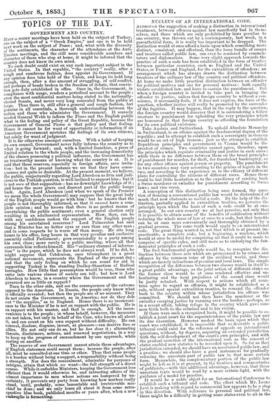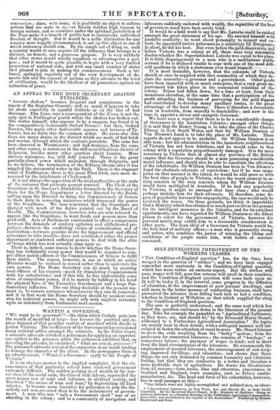NUCLEUS OF AN INTERNATIONAL CODE.
ALTHOUGH the suggestion of making a distinction in international treatment, between offences against law manifestly bad in them- selves, and those which are only prohibited by laws peculiar to one country, was thrown out by a contemporary, last week, in a parenthetical form, it is really too important to be dropped. The distinction would at once afford a basis upon which something more distinct, consistent, and effectual, than the loose bundle of essays and treatises called public law, can ever be rendered by commen- tators. and diplomatists. Some very slight approach towards the practice of such a code has been established in the form of treaties between particular countries, such as England and the United States, or France and England, for the extradition of offenders ; an arrangement which has always drawn the distinction between breakers of the ordinary law of the country and political offenders. At home we make little practical distinction between an offender for political motives and one for personal motives : both equally violate established law, and have to sustain the punishment. But when a foreign country is invited to take part in bringing the
offender to justice, unless that foreign country be without a con- science, it necessarily feels, if it does not express, the force of the question, whether justice will really be promoted by the surrender of the fugitive. It may happen, that in the reply to the question, the foreign country would discover that it is surrendering a fellow creature to punishment for upholding the very principles which are honoured in that foreign country as affording the foundation for its own political existence. Take Austria and Switzerland. To uphold Absolute Monarchy in Switzerland, is an offence against the fundamental dogma of the republic ; and to attempt to establish such a sovereignty in Geneva would be an act of high treason ; just as the attempt to establish Republican principles and government in Vienna would be the greatest of crimes. Two countries cannot agree, therefore, upon the principles which regulate criminality and justice in such cases ; while there is no difference between them on the broad principles of punishment for murder, for theft, for fraudulent bankruptcy, or for any other offence against person or property. The punishment in two countries may vary according to the genius of legists in the two, and according to the experience as to the efficacy of different plans for controlling the citizens of different races. Hence there could be but little hesitation as to the expediency of sending back a Swiss murderer or swindler for punishment according to Swiss laws ; and vice versa.
A conception of this distinction being once formed, the ques- tion of framing a conventional public law would be disburdened of much that now obstructs so useful a code. By the help of the dis- tinction, partially applied in extradition treaties, we perceive the principle upon which the basis of such a code could be at once arranged. In our own country we at last perceive, not only that it is possible to obtain some of the benefits of codification without reducing the whole mass of law at once to a code, but that benefits can be at once more conveniently and thoroughly obtained by a gradual process. The same truth would apply to an international code. The great thing wanted is, not that which is at present im- practicable, a complete code, but a beginning, a nucleus, which would at once be useful for comprising all that it could be made to comprise of specific rules, and still more as to embodying the fun- damental principles of such a code. The first fundamental principle would be, to recognize the dis- tinction between those acts which are pronounced to be crimes and offences by the common voice of the civilized world, and those which are merely infractions of peculiar and local laws. The simple recognition of the difference between two classes would in itself be a great public advantage, as the joint action of different states on the former class would be at once rendered effective and un- hesitating and the local prejudices of the second class would be justly rebuked. With respect to actions which all coun- tries agree to regard as offences, it might be established as a rule, without special extradition treaties, to remand the offender back to the country within whose jurisdiction his offence was committed. We should not then have the murderer or the swindler escaping justice by running over the border—perhaps, as in a recent affair, taking refuge in the country which gave com- mon birth both to the criminal and to his victim.
If there were such a recognized basis, it might be possible to es- tablish a joint court for the superintendence of the public law and its due execution. However modest the basis upon which that court was established; it is impossible that so desirable a public tribunal could exist for the reference of appeals on international questions, without, by degrees, acquiring an extended jurisdiction with the self-development of the court's own principles, and with the gradual accretion of the international code as the consent of states enabled new statutes to be recorded upon it. So far as that jurisdiction extended, we should have an ascertained public law, and a practice ; we should also have a good instrument for gradually reducing the uncertain part of public law to that more certain form. Meanwhile, the complementary portion of the public law might be left as it is at present, to the treatises and commentaries of publicists,—with this additional advantage, however, that these uncertain texts would be read by a more certain light, with the guidance of a model for practice. It would be a noble object for an International Conference to establish such a tribunal and code. The effort which Mr. Leone Levi is making with regard to commercial law appears to be a step in this direction. With reference to personal and political law, there might be a difficulty in getting seine states even to sit in the
convention ' • since, with some, it is positively an object to enforce actions that are mala in se—as Russia teaches high treason to foreign nations, and as countries under the spiritual jurisdiction of the Pope make it a branch of public law to contravene individual freedom of thought. But it would be a noble distinction for any country more happily circumstanced, to set up this object as one at which statesmen should aim. By the simple act of doing so, such a country would at once acquire all the influence that belongs to a distinct, an honest, and a generous purpose. It is very unlikely that other states would wholly repudiate so advantageous a cur- pose; and it would be quite possible to begin with a very limited proportion of national code and with any small number of states that pleased to join in making the commencement. Such a tri- bunal, springing regularly out of the very development of do- mestic law and the consent of nations as they advance to the level of civilization, would be the likeliest of all guarantees against an infraction of peace.



























 Previous page
Previous page